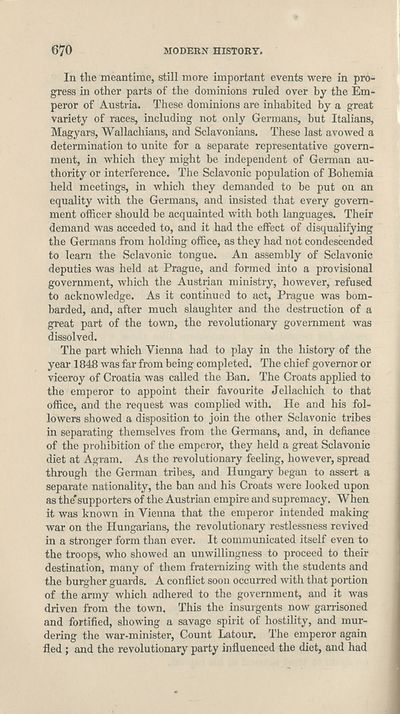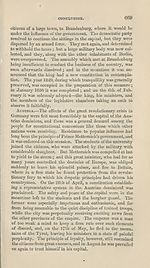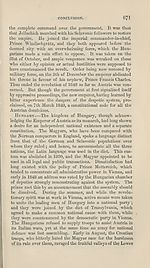Download files
Complete book:
Individual page:
Thumbnail gallery: Grid view | List view

670
MODERN HISTORY.
In the meantime, still more important events were in pro¬
gress in other parts of the dominions ruled over by the Em¬
peror of Austria. These dominions are inhabited by a great
variety of races, including not only Germans, but Italians,
Magyars, Wallachians, and Sclavonians. These last avowed a
determination to unite for a separate representative govern¬
ment, in which they might be independent of German au¬
thority or interference. The Sclavonic population of Bohemia
held meetings, in which they demanded to be put on an
equality with the Germans, and insisted that every govern¬
ment officer should be acquainted with both languages. Their
demand was acceded to, and it had the effect of disqualifying
the Germans from holding office, as they had not condescended
to learn the Sclavonic tongue. An assembly of Sclavonic
deputies was held at Prague, and formed into a provisional
government, which the Austrian ministry, however, refused
to acknowledge. As it continued to act, Prague was bom¬
barded, and, after much slaughter and the destruction of a
great part of the town, the revolutionary government was
dissolved.
The part which Vienna had to play in the history of the
year 1848 was far from being completed. The chief governor or
viceroy of Croatia was called the Ban. The Croats applied to
the emperor to appoint their favourite Jellachich to that
office, and the request was complied with. He and his fol¬
lowers showed a disposition to join the other Sclavonic tribes
in separating themselves from the Germans, and, in defiance
of the prohibition of the emperor, they held a great Sclavonic
diet at Agram. As the revolutionary feeling, however, spread
through the German tribes, and Hungary began to assert a
separate nationality, the ban and his Croats were looked upon
as the'supporters of the Austrian empire and supremacy. When
it was known in Vienna that the emperor intended making
war on the Hungarians, the revolutionary restlessness revived
in a stronger form than ever. It communicated itself even to
the troops, who showed an unwillingness to proceed to their
destination, many of them fraternizing with the students and
the burgher guards. A conflict soon occurred with that portion
of the army which adhered to the government, and it was
driven from the town. This the insurgents now garrisoned
and fortified, showing a savage spirit of hostility, and mur¬
dering the war-minister, Count Latour. The emperor again
fled ; and the revolutionary party influenced the diet, and had
MODERN HISTORY.
In the meantime, still more important events were in pro¬
gress in other parts of the dominions ruled over by the Em¬
peror of Austria. These dominions are inhabited by a great
variety of races, including not only Germans, but Italians,
Magyars, Wallachians, and Sclavonians. These last avowed a
determination to unite for a separate representative govern¬
ment, in which they might be independent of German au¬
thority or interference. The Sclavonic population of Bohemia
held meetings, in which they demanded to be put on an
equality with the Germans, and insisted that every govern¬
ment officer should be acquainted with both languages. Their
demand was acceded to, and it had the effect of disqualifying
the Germans from holding office, as they had not condescended
to learn the Sclavonic tongue. An assembly of Sclavonic
deputies was held at Prague, and formed into a provisional
government, which the Austrian ministry, however, refused
to acknowledge. As it continued to act, Prague was bom¬
barded, and, after much slaughter and the destruction of a
great part of the town, the revolutionary government was
dissolved.
The part which Vienna had to play in the history of the
year 1848 was far from being completed. The chief governor or
viceroy of Croatia was called the Ban. The Croats applied to
the emperor to appoint their favourite Jellachich to that
office, and the request was complied with. He and his fol¬
lowers showed a disposition to join the other Sclavonic tribes
in separating themselves from the Germans, and, in defiance
of the prohibition of the emperor, they held a great Sclavonic
diet at Agram. As the revolutionary feeling, however, spread
through the German tribes, and Hungary began to assert a
separate nationality, the ban and his Croats were looked upon
as the'supporters of the Austrian empire and supremacy. When
it was known in Vienna that the emperor intended making
war on the Hungarians, the revolutionary restlessness revived
in a stronger form than ever. It communicated itself even to
the troops, who showed an unwillingness to proceed to their
destination, many of them fraternizing with the students and
the burgher guards. A conflict soon occurred with that portion
of the army which adhered to the government, and it was
driven from the town. This the insurgents now garrisoned
and fortified, showing a savage spirit of hostility, and mur¬
dering the war-minister, Count Latour. The emperor again
fled ; and the revolutionary party influenced the diet, and had
Set display mode to:
![]() Universal Viewer |
Universal Viewer | ![]() Mirador |
Large image | Transcription
Mirador |
Large image | Transcription
| Antiquarian books of Scotland > Education > Elements of universal history on a new and systematic plan > (690) |
|---|
| Permanent URL | https://digital.nls.uk/127588420 |
|---|
| Description | Thousands of printed books from the Antiquarian Books of Scotland collection which dates from 1641 to the 1980s. The collection consists of 14,800 books which were published in Scotland or have a Scottish connection, e.g. through the author, printer or owner. Subjects covered include sport, education, diseases, adventure, occupations, Jacobites, politics and religion. Among the 29 languages represented are English, Gaelic, Italian, French, Russian and Swedish. |
|---|

